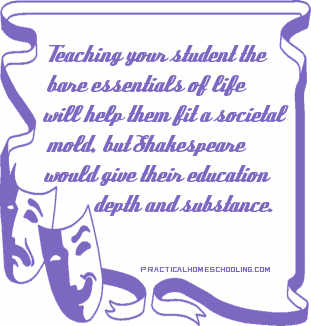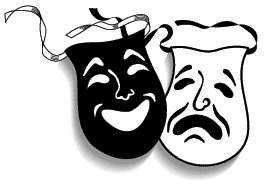 One of the reasons why homeschoolers have left the public schools is because the latter no longer teach the subjects that elevate the spirit and introduce students to the beauties and values of our English literary heritage. That's because the goal of Outcome Based Education, the current federally- and state-sponsored educational fad, is to produce graduates who spend their lives as efficient and low-paid factory and service workers, hopefully as good as those in China and Mexico. None of those factory workers need to know our English literary heritage in order to perform well at their jobs. So according to American curriculum developers, neither do Americans need such education.
One of the reasons why homeschoolers have left the public schools is because the latter no longer teach the subjects that elevate the spirit and introduce students to the beauties and values of our English literary heritage. That's because the goal of Outcome Based Education, the current federally- and state-sponsored educational fad, is to produce graduates who spend their lives as efficient and low-paid factory and service workers, hopefully as good as those in China and Mexico. None of those factory workers need to know our English literary heritage in order to perform well at their jobs. So according to American curriculum developers, neither do Americans need such education.
But the purpose of education is not to train your child like an animal so that he or she can respond efficiently to planned stimuli. The true purpose of education is to help an individual see his or her place in the cosmic scheme of things, in relation to God, in relation to history. Skinnerian animal training, the operant-conditioning technique used in "direct instruction" in our schools, is based on the assumption that human beings do not have souls, that they are animals and can be trained as such.
This works fine for teaching automatic, quick responses to such things as hearing a bell or seeing a "Stop" sign. Kids can learn this. Even animals can learn this. That may be one reason why journalists today often confuse chimps' automatic reactions to stimuli with "learning" and "talking." But the simple fact is that animals can be trained, but they can't be educated. Human beings, on the other hand, can not only be trained, but because they have innate intelligence and souls, they can also be educated.
Teaching the poems and plays of Shakespeare opens the reader to the expanse and depth of the human soul, because the characters in the plays represent a cross-section of human life and aspiration. And Shakespeare does it better than any other writer in the history of literature. Why? Because he had keener insight into human nature than any other playwright and was able to put into words of beauty and power human action in all its emotional and intellectual complexity.
Think of the immortal characters Shakespeare has created: Hamlet, Julius Caesar, Falstaff, King Lear, Othello, Macbeth, Romeo and Juliet, and so many others. A study of each of these characters is a study in human psychology. And the reason why we read them 400 years later is because human nature has not changed, and because Shakespeare wrote truthfully about them.
So we know why we should teach Shakespeare. But how to do it is another thing. Charles Lamb and his wife Mary wrote a book in which they tell children the stories from Shakespeare's plays. The Lamb book, Famous Stories from Shakespeare Retold for Boys and Girls, is a very good way to introduce children to the great poet. As a playwright, Shakespeare was also a great story teller.
 Another good reason to teach Shakespeare is because he wrote in Elizabethan English, the same language used in the King James version of the Bible. Children who learn to read the King James version of the Bible will also be able to read Shakespeare and memorize some of the sonnets and at least one or two of the great soliloquies. Such memorization will enrich the soul, and expand the vocabulary and understanding of the child. Also, this can open up the entire subject of language development and why we speak so much differently than those in the days of Queen Elizabeth I. Even in modern America, language usage and meaning have changed greatly in the last one hundred years.
Another good reason to teach Shakespeare is because he wrote in Elizabethan English, the same language used in the King James version of the Bible. Children who learn to read the King James version of the Bible will also be able to read Shakespeare and memorize some of the sonnets and at least one or two of the great soliloquies. Such memorization will enrich the soul, and expand the vocabulary and understanding of the child. Also, this can open up the entire subject of language development and why we speak so much differently than those in the days of Queen Elizabeth I. Even in modern America, language usage and meaning have changed greatly in the last one hundred years.
One of the great pleasures in teaching your child Shakespeare is to give yourself the opportunity to read some of the plays you never read in school. Because the plays are meant to be read aloud, as on a stage, you and your child can have a great time taking parts in the plays and becoming the characters. And because the plays are much shorter than novels, you can complete reading a play in a relatively short period of time.
By studying Shakespeare you also introduce your child to a standard of literary quality that is the highest in our language and becomes a foundation for delving further into our literary heritage. You cannot be considered truly educated unless you've read enough of Shakespeare so that you can discuss him intelligently with others. Familiarity with Shakespeare is as essential as familiarity with our historical heritage. And once you've studied Shakespeare, he becomes a permanent part of your life.